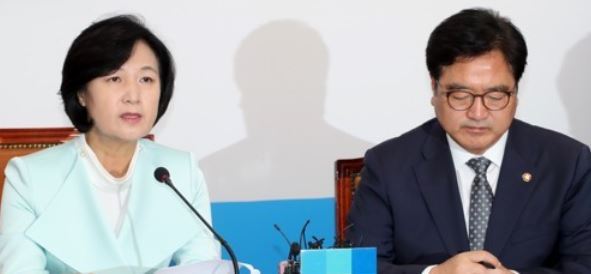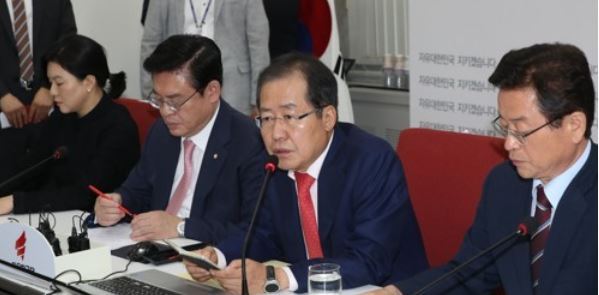Ruling party leader reiterates opposition to nuclear armament
By YonhapPublished : Sept. 11, 2017 - 11:41
The ruling party leader on Monday reiterated her opposition to growing calls for South Korea's nuclear armament, saying North Korea's nuclear standoff must be settled through political and diplomatic means.
Choo Mi-ae of the Democratic Party aligned her position with that of the government, as conservative parties doubled down on their demand for Seoul to explore nuclear options, such as the redeployment of US tactical nukes withdrawn from here in 1991.
"It is undesirable for us to be seen as having no will to resolve (the standoff) politically and diplomatically any more, amid this dispute over nuclear armament," Choo said during a meeting with senior party officials.
Choo Mi-ae of the Democratic Party aligned her position with that of the government, as conservative parties doubled down on their demand for Seoul to explore nuclear options, such as the redeployment of US tactical nukes withdrawn from here in 1991.
"It is undesirable for us to be seen as having no will to resolve (the standoff) politically and diplomatically any more, amid this dispute over nuclear armament," Choo said during a meeting with senior party officials.

"Strong sanctions, after all, seek to bring the North to the dialogue table, and the solution to 70 years of the Cold War and division must be a peaceful one. ... The purpose of security is peace, and for us, political and diplomatic means are the only solutions," she added.
Choo has repeatedly objected to any nuclear options, as political discourse has quickly shifted toward military reinforcements following the North's sixth and most powerful nuclear test on Sept. 3.
In an apparent sign of a policy shift, the US Trump administration is considering proposing small, tactical nuclear weapons to cope with growing threats from the North, Russia and other potential adversaries, US-based media outlet Politico has reported, further fueling the talk of a tit-for-tat nuclear approach here.
Seoul's presidential office Cheong Wa Dae chimed in Sunday, saying its principle for a nuclear-free Korean Peninsula remains unchanged, and that it has never weighed the redeployment of US tactical nukes.
On Monday, Prime Minister Lee Nak-yon also said the government is not considering bringing tactical nuclear weapons back into the country, stressing that a nuclear-free Korean Peninsula remains the goal of the government.
"We're under the United States' nuclear umbrella," he said during a parliamentary interpellation session. "I believe we should not give up on the principle of denuclearization."
During the party meeting, the ruling party chief also voiced her appreciation to German Chancellor Angela Merkel's remarks in an interview that showed her willingness to engage in a diplomatic initiative to address the nuclear standoff.
In the interview with Germany's newspaper, the Frankfurter Allgemeine Sonntagszeitung, published Sunday, Merkel mentioned the landmark 2015 nuclear deal, struck between Iran and six world powers, including Germany, as a possible model.
"I thank (Chancellor Merkel) for expressing the principle of a peaceful resolution," Choo said.

However, Hong Joon-pyo, the leader of the main opposition Liberty Korea Party, ramped up his party's demand for nuclear armament, stressing that Seoul, if determined, could develop nuclear arms must faster than Pyongyang, given its cutting-edge technologies and nuclear materials.
"Given the experts' views, our country has the technology and capability to sufficiently develop nuclear arms within one year," he said during a party meeting.
"Based on my determination that we have to safeguard our country and people, we will seek a signature-collecting campaign for the redeployment of tactical nukes and launch diplomatic efforts for it," he added.
Hong's party has called for Seoul to pursue a nuclear balance of power to counter Pyongyang's "nuclear monopoly." It has also stressed the pursuit of tactical nukes would help the United States further enhance the credibility of its security commitment to the South.
The splinter Bareun Party echoed the call.
"If the North is equipped with nuclear strike capabilities, we need tactical nukes to fend them off," Joo Ho-young, the party whip, said during a meeting with senior party officials.
Aside from the tactical nukes, his party has demanded Seoul consider seeking to share the control of nuclear arms with Washington under a deal similar to America's arrangements with some of its NATO allies, including Germany, Italy and Belgium. (Yonhap)





![[From the Scene] Monks, Buddhists hail return of remains of Buddhas](http://res.heraldm.com/phpwas/restmb_idxmake.php?idx=644&simg=/content/image/2024/04/19/20240419050617_0.jpg&u=20240419175937)





![[Graphic News] French bulldog most popular breed in US, Maltese most popular in Korea](http://res.heraldm.com/phpwas/restmb_idxmake.php?idx=644&simg=/content/image/2024/04/18/20240418050864_0.gif&u=)



![[From the Scene] Monks, Buddhists hail return of remains of Buddhas](http://res.heraldm.com/phpwas/restmb_idxmake.php?idx=652&simg=/content/image/2024/04/19/20240419050617_0.jpg&u=20240419175937)

![[KH Explains] Hyundai's full hybrid edge to pay off amid slow transition to pure EVs](http://res.heraldm.com/phpwas/restmb_idxmake.php?idx=652&simg=/content/image/2024/04/18/20240418050645_0.jpg&u=20240419100350)

![[Today’s K-pop] Illit drops debut single remix](http://res.heraldm.com/phpwas/restmb_idxmake.php?idx=642&simg=/content/image/2024/04/19/20240419050612_0.jpg&u=)